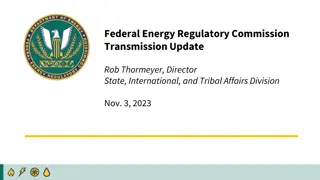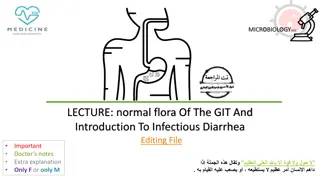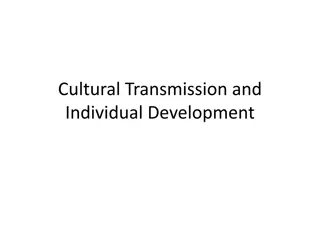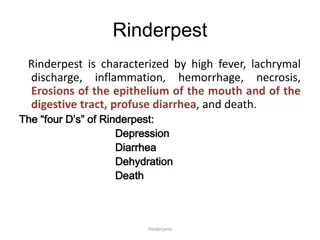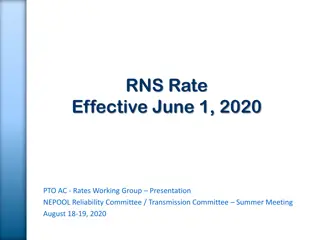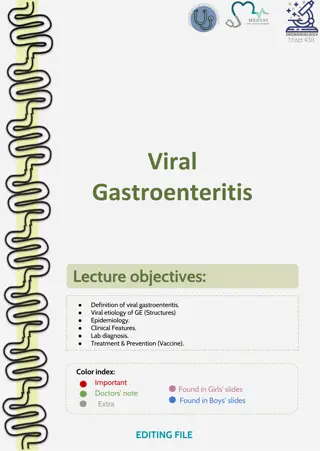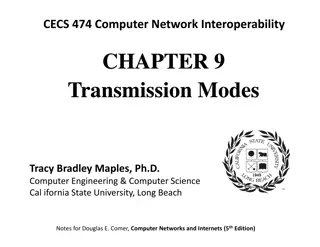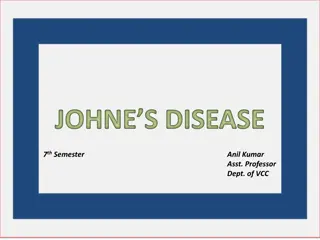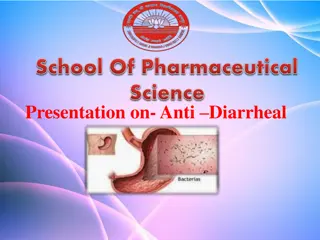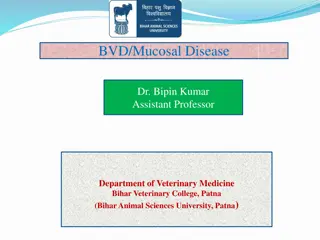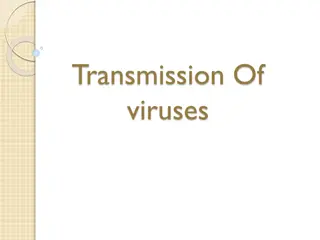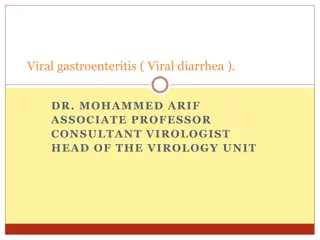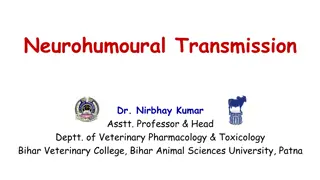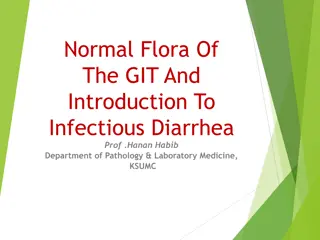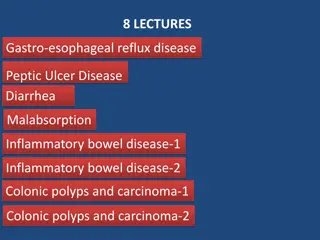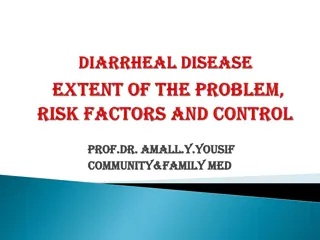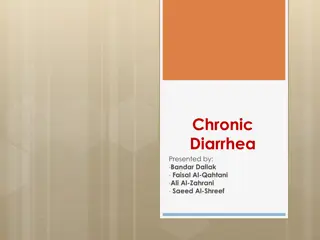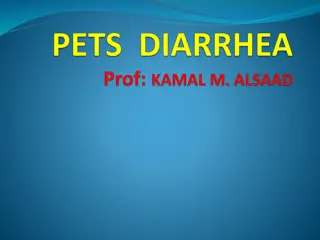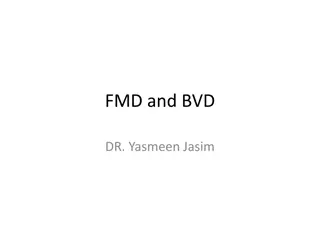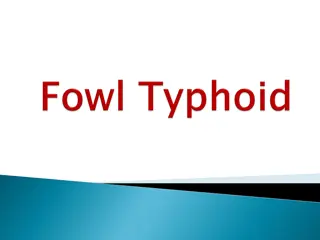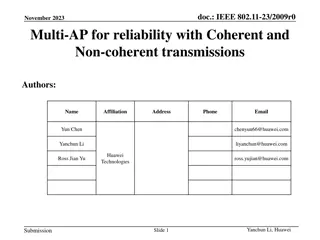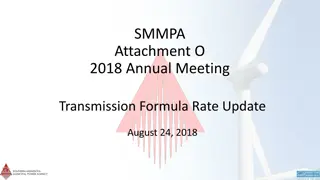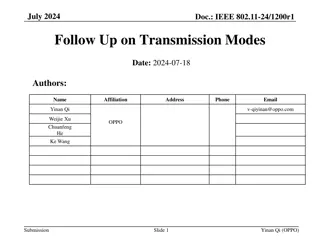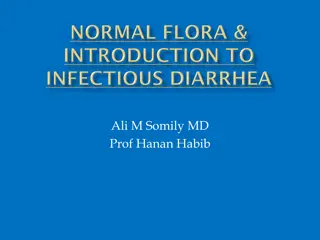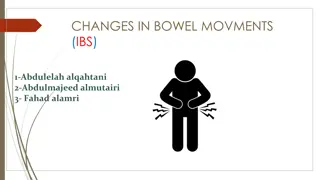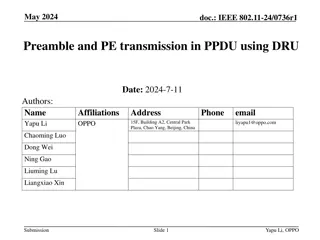MRES Transmission Update: Projects, Rates, and Regulatory Changes - August 25, 2023
Explore the latest updates on MRES transmission projects, rate adjustments, and regulatory developments discussed during the meeting on August 25, 2023. Details include MRES member rate information, specific rate adjustments for MMU and WMU, transmission project energization, true-up information, an
1 views • 15 slides
TELECOMMUNICATIONS MEDIA
Telecommunications is the electronic transmission of information over distances, including voice calls, data, text, images, and video. It encompasses a range of technologies like fiber optics, satellites, telephones, and the Internet. Components of a telecommunications network include terminals, int
5 views • 13 slides
MRES Transmission Project Updates and Regulatory Overview
John Weber, Senior Transmission Engineer, presents key updates on MRES transmission projects, including the energization of the Lorain Substation and recent restoration efforts post-tornado strike at Elbow Lake Substation. The meeting agenda covers MRES member rate information, regulatory changes, a
1 views • 15 slides
Federal Energy Regulatory Commission Transmission Update - Nov. 3, 2023
FERC, led by Director Rob Thormeyer, regulates natural gas wholesale facilities, interstate pipelines, onshore LNG facilities, wholesale electric market rates, and more. The Commission consists of five appointed Commissioners overseeing key initiatives like transmission planning proposals and interc
0 views • 14 slides
Understanding Normal Flora of the Gastrointestinal Tract & Infectious Diarrhea
Normal flora in the gastrointestinal tract play a crucial role in maintaining health, but can also cause disease in certain conditions. This lecture covers the common flora in the GIT, their role in diseases, various types of acute diarrheal illnesses, epidemiology, and management of bacterial agent
1 views • 26 slides
Understanding Cultural Transmission and Individual Development
Cultural transmission plays a crucial role in perpetuating features across generations through processes like enculturation and socialization. It involves the transmission of values, beliefs, and skills from parents and peers, shaping individual development. The interaction between biological and cu
0 views • 40 slides
Understanding Rinderpest: Symptoms, Transmission, and Host Range
Rinderpest is a viral disease characterized by high fever, lachrymal discharge, inflammation, erosions of the mouth, and diarrhea, leading to death. The disease affects cloven-hoofed animals, with cattle and water buffalo being most susceptible. Transmission occurs through aerosol vectors and ingest
0 views • 60 slides
Understanding Performance of Transmission Lines in Electrical Engineering
The performance of a transmission line in power systems is critical for efficient operation. Factors such as voltage drop, line losses, and transmission efficiency are key considerations in design and operation. The line parameters of resistance, inductance, capacitance, and shunt conductance play c
2 views • 26 slides
Transmission Rate Change Overview for June 1, 2020
Presentation on the Rate Change effective June 1, 2020, detailing RNS Rate adjustments, Annual Transmission Revenue Requirements, and Regional Forecasts. The RNS Rate increased to $129.26/kW-year reflecting transmission project impacts, while ATRR analysis showed changes in revenue requirements for
0 views • 25 slides
Overview of Viral Gastroenteritis: Etiology, Epidemiology, Clinical Features, Diagnosis, and Treatment
Viral gastroenteritis is an inflammation of the gastrointestinal tract primarily affecting the stomach and small intestine, leading to symptoms like acute diarrhea and vomiting. It can be caused by various infectious agents such as Rotavirus, Adenovirus, Caliciviruses, Astrovirus, Coronavirus, Torov
1 views • 7 slides
Understanding Transmission Modes in Computer Networks
Transmission modes in computer networks can be divided into serial and parallel modes. Parallel transmission allows multiple bits to be sent simultaneously over separate media, while serial transmission sends one bit at a time. The choice between serial and parallel transmission depends on factors s
0 views • 13 slides
IEEE 802.11-21/1737r0 Beacon and Group Frames Information
This document discusses the transmission of Beacon and group addressed frames in IEEE 802.11 networks, focusing on the impact of frame types and MCS on BSS range and transmission rate. It proposes out-of-band signaling to assist scanning STAs in determining BSS range and non-AP MLDs in selecting a l
0 views • 14 slides
Understanding Johne's Disease in Ruminants: Causes, Transmission, and Clinical Findings
Johne's Disease, caused by Mycobacterium paratuberculosis, is a chronic bacterial infection affecting the lower intestinal tract of ruminants. It is characterized by chronic diarrhea and emaciation, mainly seen in mature animals. The mode of transmission includes contaminated food/water, intrauterin
0 views • 12 slides
Understanding Anti-Diarrheal Agents and Their Mechanisms
Diarrhea is a common gastrointestinal issue characterized by increased bowel movements and abdominal discomfort. This presentation delves into the causes and types of diarrhea, including acute and chronic forms. It also explores the various classes of anti-diarrheal medications and their mechanisms
0 views • 23 slides
Understanding Bovine Virus Diarrhea and Mucosal Disease in Cattle
Bovine Virus Diarrhea (BVD) and Mucosal Disease (MD) are two clinically distinct yet interconnected syndromes in cattle caused by Pestivirus. While originally thought to be separate, they share a common viral etiology. BVD can lead to persistent infections, while MD is sporadic, progressive, and fat
0 views • 14 slides
Understanding the Transmission of Viruses: Routes and Implications
Viruses are intracellular parasites that require transmission to a new host to evade immune responses. This transmission process, whether through respiratory droplets, fecal-oral routes, or sexual contact, is crucial in the viral life cycle. Different modes of transmission, such as horizontal and ve
0 views • 11 slides
Understanding Viral Gastroenteritis: Causes, Symptoms, and Transmission
Viral gastroenteritis, commonly known as viral diarrhea, is a prevalent infection affecting mainly infants and young children. The disease is self-limiting, with symptoms like diarrhea, vomiting, and abdominal pain. Key viral etiologies include Rota viruses, Astroviruses, Norovirus, and Enteric aden
0 views • 19 slides
Understanding Neurohumoural Transmission in Veterinary Pharmacology
Neurohumoural transmission in the field of veterinary pharmacology involves the communication of nerve messages through the release of chemical messengers. This process includes axonal conduction and junctional transmission. The historical aspects of neurohumoural transmission highlight key discover
5 views • 11 slides
Understanding the Normal Flora of the Gastrointestinal Tract and Infectious Diarrhea
Explore the common normal flora of the gastrointestinal tract (GIT) and how they play a role in health and disease, specifically focusing on infectious diarrhea. Learn about different types of acute diarrheal illnesses, epidemiology, host defenses against GI infections, and the pathogenesis of bacte
0 views • 38 slides
Understanding Diarrhea: Causes, Classification, and Significance
This informative content delves into the physiology of fluid in the small intestine, defines diarrhea, and outlines its various types and common causes. It emphasizes the importance of addressing diarrhea promptly to prevent dehydration and electrolyte imbalances, especially in children, as it remai
3 views • 52 slides
Understanding Feco-Oral Diseases and Diarrhea Transmission
Feco-oral diseases, primarily transmitted through the fecal-oral route, remain a significant global health concern, especially affecting children under 5 and the elderly. Diarrhea, characterized by WHO as three or more watery stools in 24 hours, poses a substantial burden, with infectious agents cau
0 views • 46 slides
Superconductivity and Electrical Transmission Losses: Exploring Potential Solutions
The lecture delves into the factors controlling electrical transmission losses, highlighting how using superconductors could lead to zero transmission loss. However, the challenge lies in the low critical temperature (Tc) of most materials. Despite the discovery of superconductivity in 1911, practic
2 views • 9 slides
Understanding Chronic Diarrhea: Causes and Consequences
Chronic diarrhea is characterized by persistent loose, watery stools lasting more than 14 days. The condition can be caused by various factors such as osmotic, secretory, inflammatory, or motility disorders. In developing countries, it often follows acute infections, while in developed countries, un
0 views • 71 slides
Understanding Diarrhea: Causes, Symptoms, and Pathophysiology
Diarrhea is a common symptom that can be caused by various factors such as viral, bacterial, parasitic infections, dietary changes, drugs, systemic diseases, and intestinal obstructions. It can lead to dehydration and other serious complications if not treated promptly. The pathophysiology of diarrh
0 views • 15 slides
Rochester Public Utilities Presentation on True-up of Attachment O Transmission Revenue Requirements
Rochester Public Utilities (RPU) holds annual meetings to discuss and provide information on the calculation of the True-up of RPU's 2016 Annual Transmission Revenue Requirements. The presentation also covers the True-up Adjustment applied to the 2018 Forward-Looking Rate. RPU uses a FERC-approved F
0 views • 14 slides
Understanding Foot-and-Mouth Disease (FMD) and Bovine Viral Diarrhea (BVD)
Foot-and-mouth disease (FMD) is a highly contagious animal disease affecting cloven-hoofed animals, while Bovine Viral Diarrhea (BVD) is a serious cattle disease caused by the BVD virus. FMD is not transmissible to humans and is caused by different strains of Aphthovirus. Symptoms of FMD include ves
0 views • 12 slides
Enhancing Transmission Infrastructure for Reliable and Efficient Energy Delivery
Interregional transmission plays a crucial role in ensuring energy reliability and cost efficiency, especially during extreme weather events. Connecting areas with diverse net load reduces costs and enables significant power transfers. Investing in bigger transmission lines leads to lower losses and
0 views • 9 slides
Understanding Fowl Typhoid in Domestic Birds
Fowl Typhoid is a septicemic disease affecting domestic birds, characterized by acute and chronic phases, enlarged spleen, bronzy colored liver, and diarrhea. It is caused by Salmonella gallinarum and primarily affects young and adult chickens. The disease has a short incubation period of 4-5 days,
0 views • 7 slides
Overview of Bovine Viral Diarrhea Virus (BVDV)
Bovine Viral Diarrhea Virus (BVDV) is an RNA virus belonging to the Pestivirus genus in the Flaviviridae family. It is classified into BVDV-1 and BVDV-2 genotypes with distinct biotypes. BVDV is a significant infectious disease in the livestock industry worldwide, with high prevalence and clinical c
0 views • 14 slides
Transmission Engineer Meeting Summary - August 23, 2024
John Weber, Senior Transmission Engineer, led a meeting discussing MRES true-up for 2023 historical rate information, regulatory changes, and transmission projects. The meeting covered MRES member rate information and highlighted MRES transmission facilities, FERC background, and recent projects inc
0 views • 15 slides
Multi-AP for Reliable Wireless Transmission with Coherent and Non-coherent Technology
In this IEEE 802.11-23/2009r0 document, the concept of Multi-AP coordination is discussed to achieve Ultra High-reliability (UHR) goals. The use of both Coherent Joint Transmission (JT) and Non-coherent transmission technologies is explored for improved reliability and performance in wireless commun
0 views • 16 slides
SMMPA Annual Meeting Transmission Rate Update 2018
SMMPA, a not-for-profit political subdivision in Minnesota, updated its transmission rate formula in August 2018. The Attachment O timeline outlines crucial dates for stakeholders, including the annual meeting on formula rate updates. SMMPA, as a Transmission Owner in MISO, follows FERC-approved tem
0 views • 8 slides
Rochester Public Utilities - Forward-Looking Transmission Revenue Update
Rochester Public Utilities (RPU) presents an update on the forward-looking transmission revenue requirements for calendar year 2021. The presentation covers the regulatory background, rate calculations, and adjustments for the upcoming year. Key topics include the FERC-approved formula rate, true-up
0 views • 13 slides
Recap of IEEE 802.11-24/1200r1 - July 2024 Transmission Modes
This contribution discusses the harmonized waveform design and various transmission modes for active UL transmission in IEEE 802.11-24/1200r1 document. It presents multiple proposed solutions, waveform types, feasibility, and benefits of active UL transmission. The aim is to achieve optimal design c
0 views • 8 slides
Proposed Amendments to GRIDCO Regulations for Transmission Charges
The proposed amendments to the CERC regulations aim to alleviate the burden of transmission charges on GRIDCO and consumers in Odisha. The amendments focus on the sharing of inter-state transmission charges and losses, including the substitution of LTA/MTOA with GNA for sharing transmission charges.
0 views • 7 slides
Study on Using MLIL Model to Replace RIL for Studying Bacterial Diarrhea
Shigellosis, a diarrheal disease prevalent in developing countries, lacks an effective vaccine. This study aims to assess the protective capability of S. dysenteriae sub-unit pili proteins using the MLIL method. Mice were immunized with different protein variants, and the results indicate potential
0 views • 16 slides
Understanding Acute Diarrheal Illness and Gastrointestinal Infections
Acute diarrheal illness is a common issue globally, leading to significant morbidity and mortality. This lecture covers the types of acute diarrhea, host defenses, pathogens like E. coli, Campylobacter, and Yersinia, and their management. It also discusses microbiological diagnosis methods, food poi
0 views • 30 slides
Understanding Irritable Bowel Syndrome: Symptoms, Diagnosis, and Management
Define constipation and diarrhea, discuss the definition, etiology, and classification of IBS, explain how to diagnose IBS, list alarm symptoms and differential diagnosis, provide a management plan and follow-up, and recognize when to refer to a specialist. People with irritable bowel syndrome may s
0 views • 35 slides
Preamble and PE Transmission in PPDU Using DRU
The document discusses the transmission of Preamble and Physical End with the DRU technology in PPDU for IEEE 802.11 networks. It covers various aspects such as legacy preamble, UHR-STF, UHR-LTF, PE fields, and SIG transmission. The focus is on achieving compatibility and performance efficiency in D
0 views • 13 slides
Understanding Giardia: Morphology, Life Cycle, and Pathogenesis
Giardia is a protozoan parasite that causes chronic diarrhea in various hosts, including humans and animals. This parasite has unique morphology with trophozoite and cyst stages. Its life cycle involves direct reproduction through binary fission and transmission through contaminated food or water. G
0 views • 19 slides



